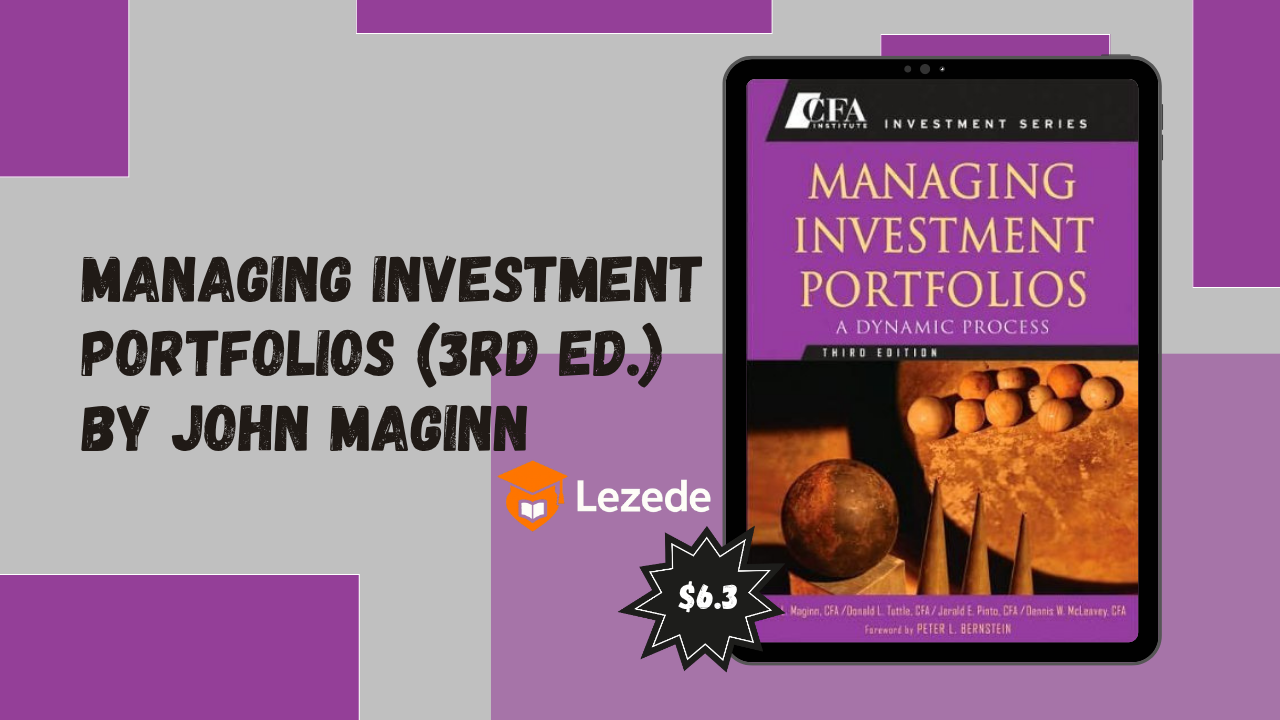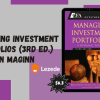Managing Investment Portfolios (3rd Ed.) By John Maginn Free Download – Includes Verified Content:
Managing Investment Portfolios: A Comprehensive Review of the Third Edition by John Maginn
In the fast-changing world of finance, Managing Investment Portfolios: A Dynamic Process, Third Edition by John Maginn and his co-authors remains an authoritative resource for both aspiring and experienced investment professionals. As part of the renowned CFA Institute Investment Series, this edition serves graduate-level students and active practitioners, emphasizing its broad importance within the finance industry. With its well-organized content and in-depth insights, the book not only simplifies the complexities of portfolio management but also provides the essential tools needed to thrive in a dynamic investment landscape.
A Comprehensive Resource for Professionals and Students
Managing Investment Portfolios: A Dynamic Process is a go-to guide for anyone seeking to strengthen their knowledge of investment management. Whether you are beginning your career in finance or are a seasoned investor aiming to fine-tune your strategies, this book delivers value to every level of expertise. Authors John L. Maginn, Donald Tuttle, Jerald Pinto, and Dennis McLeavey merge theoretical foundations with practical insights, ensuring that readers find the material both accessible and actionable.
Being part of the CFA Institute Investment Series enhances the book’s authority. Its alignment with the latest market practices ensures that readers gain a current and applicable understanding of portfolio management. This connection guarantees that the strategies and principles presented are both rigorous and industry-relevant.
Emphasizing the Dynamic Nature of Portfolio Management
A notable aspect of this third edition is its focus on the evolving and dynamic nature of managing portfolios. The authors walk readers through every step of the investment process, starting with crafting investment policy statements. This critical step ensures that investors define their objectives clearly and identify constraints—whether managing personal funds or institutional portfolios.
Key Components of Portfolio Management:
-
Asset Allocation: Exploring how to spread investments across various asset classes to manage risk and maximize returns.
-
Risk Management: Techniques to identify, measure, and reduce portfolio risks.
-
Equity & Fixed-Income Management: Approaches for handling stocks and bonds to achieve optimal results.
-
Monitoring and Rebalancing: Ongoing review and adjustments to maintain portfolio alignment with goals.
The authors use real-world examples and case studies to demonstrate these strategies, enabling readers to effectively convert theory into real investment decisions.
Theoretical Insights and Practical Applications
This edition strikes a strong balance between academic concepts and practical execution. Complex ideas are explained clearly, ensuring that both students and professionals can easily apply them in real scenarios.
Workbook and Additional Resources
A complementary workbook accompanies the main text, offering exercises and tools to reinforce understanding. These practical tasks encourage active learning and help readers evaluate their skills by simulating real portfolio management challenges.
Ethical Responsibilities in Portfolio Management
In modern finance, ethics are integral to investment decisions. This edition dedicates ample focus to ethical standards, highlighting how trust and transparency directly impact long-term client relationships.
Core Ethical Themes:
-
Setting clear, realistic investment objectives aligned with client goals.
-
Respecting investor constraints, including personal needs or institutional regulations.
-
Navigating dilemmas like conflicts of interest or fiduciary duties with professionalism.
Academic and Professional Reception
Since its release, this third edition has earned recognition for its clarity, depth, and practical approach. Both academics and professionals have praised its ability to blend rigorous analysis with real-world applications.
Highlights from Reviews:
-
Comprehensive Coverage: A thorough approach to portfolio management principles.
-
Clarity: Accessible explanations that simplify complex concepts.
-
Real-World Focus: Practical examples and exercises strengthen its utility.
Integrating Modern Ideas and Frameworks
To remain relevant, the book incorporates contemporary investment trends and methodologies.
Key Modern Themes:
-
Fintech Innovations: How technology and data analytics enhance portfolio strategies.
-
Sustainable Investing: Applying ESG (Environmental, Social, and Governance) criteria to create long-term value.
-
Globalization: Understanding the impact of interconnected global markets on portfolio construction.
Frameworks for Modern Portfolio Theory
Building on Modern Portfolio Theory (MPT), the book dives into advanced concepts like:
-
Behavioral Finance: Examining how biases affect investment choices.
-
Quantitative Analysis: Using data-driven models for optimization.
-
Alternative Investments: Exploring non-traditional assets for better diversification.
Practical Management Strategies
The book emphasizes actionable strategies such as strategic and tactical asset allocation, effective diversification across non-correlated assets, and techniques like stress testing and hedging to manage risk.
Monitoring and Rebalancing Strategies
Constant portfolio review and periodic rebalancing are crucial for achieving consistent performance. The authors outline various approaches, including:
-
Calendar Rebalancing: At regular intervals (e.g., annually).
-
Threshold Rebalancing: Triggered when asset weights deviate significantly.
-
Dynamic Rebalancing: Adjusting in real-time based on market movements.
The Role of Ethical Responsibilities
The authors stress transparency and integrity as vital for building client trust. Ethical practices are presented as non-negotiable elements of effective portfolio management.
Enhancing Learning with Practical Exercises
The workbook provides:
-
Case Studies: Real investment scenarios for decision-making.
-
Quantitative Problems: Calculations on risk, asset allocation, and optimization.
-
Discussion Prompts: Encouraging critical thinking about ethics and strategy.
Integration of Modern Frameworks and Ideas
The text also covers behavioral finance, ESG investing, and fintech advancements like algorithmic trading and automated portfolio monitoring, ensuring readers stay ahead of industry trends.
Academic and Professional Endorsements
The book’s inclusion in university finance curricula and professional CFA training programs highlights its academic rigor and industry relevance.
Conclusion
Managing Investment Portfolios: A Dynamic Process, Third Edition by John Maginn and co-authors is a must-read for anyone serious about investment management. Blending theory with practical execution, ethical standards, and modern techniques, this book equips readers with the knowledge and skills to excel in today’s financial markets.











